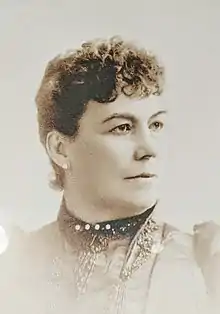Sarah Kidder
Sarah Clark Kidder (var. Sara) (c.1839 - September 1933) was president of Northern California's Nevada County Narrow Gauge Railroad (NCNGRR) from 1901 to 1913. She was the first female railroad president in the world.


Railroad presidency
Kidder became majority owner and president of the NCNGRR upon the death of her husband in 1901. Under her management, she was able to retire the company's debt and return dividends to the shareholders.[1] During this period the railroad also built the Bear River Bridge, which was at the time the tallest in California. It cut two miles,[2] and eight minutes, from the length of the trip between the two ends of the railroad.[3][4]
In 1913, shortly after settling a legal challenge to her ownership of the railroad,[1] she sold her stock and moved to San Francisco.[5]
Personal life
Born Sarah A. Clark in Ohio, Kidder married civil engineer John Flint Kidder in 1874. They moved to Grass Valley, California the following year.[6] Their home was a large mansion (sources disagree on eighteen[1] or twenty-eight[7] room) mansion, adjacent to the railroad tracks. She hosted social gatherings and also did volunteer work for an orphan society.[4]
Her adopted daughter, Beatrice, married Harvard University graduate Howard Ridgely Ward, and had three children.[8][9]
Kidder remained in San Francisco after selling the railroad, and died there in 1933, at the age 94.[10] She is interred at the Odd Fellow's Columbarium.[7]
Honors
In honor of Sarah, John, and Beatrice Kidder, the Ancient and Honorable Order of E Clampus Vitus planted three trees in Grass Valley's Clamper Square.[10] Two other plaques mentioning Kidder have also been placed at either end of the railroad.[11]
The Nevada County Narrow Gauge Railroad Museum's railbus is named after Kidder.[12]
References
- Brower, Maria E. (2003-05-17). "Sarah Kidder She ran the Narrow Gauge Railroad for 'Twelve Golden Years'". The Union. Grass Valley, CA. Retrieved 2019-04-04.
- "Constructing a Very High Railway Bridge". The Bridgemen's Magazine. 9: 192–193. April 1909.
- "Nevada County Narrow Gauge Railroad". Pacific Coast Narrow Gauge. Retrieved 2019-04-04.
- Bommersbach, Jana (February 1, 2007). "Railroad's First Lady". True West Magazine. Retrieved 2009-05-18.
- "NEVADA COUNTY NARROW GAUGE CHANGES HANDS STOCKHOLDERS ALL DISPOSE OF THEIR INTERESTS LAST WEEK". California Digital Newspaper Collection. Truckee, CA: Truckee Republican. 1 May 1913. Retrieved 2019-04-04.
- "John F. Kidder's long struggle against death is at an end". The San Francisco Call. 87 (132). April 11, 1901. Retrieved 2009-05-21.
- Hamilton, Brian (2014-03-23). "Students solve 110-year mystery of final resting place of county's narrow gauge railroad's 'first family'". The Union. Grass Valley, CA. Retrieved 2019-04-04.
- "Married" (PDF). The New York Times. September 21, 1905. Retrieved 2009-05-18.
- Harvard College Class of 1903 Quindecennial Report. Plimpton Press. 1920. p. 314.
- Wyckoff, Bob (2008-05-09). "A family's arboreal home on Clamper Square". The Union. Grass Valley, CA. Retrieved 2009-05-21.
- E Clampus Vitus Plaque Book 1930-1995. Oakland, CA. 1995. pp. 106, 190, 192.
- "Rolling Stock". Nevada County Narrow Gauge Railroad Museum. Retrieved 2019-04-04.
Further References
- Levinson, Nancy Smiler (1997). "Sarah Clark Kidder: Short Line Railroad President". She's Been Working on the Railroad. Lodestar Books. ISBN 9780525675457.
- Wyckoff, Robert M., ed. (1986). Never Come, Never Go! The Story of Nevada County's Narrow Gauge Railroad. ISBN 0961526106.
| Preceded by John Flint Kidder |
President of Nevada County Narrow Gauge Railroad 1901 – 1913 |
Succeeded by |